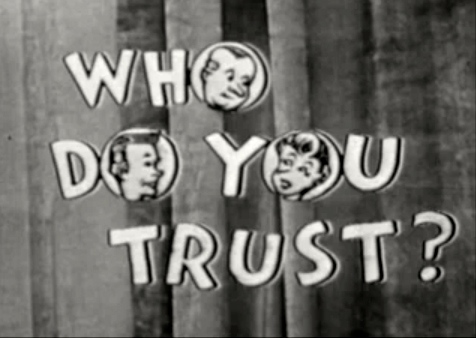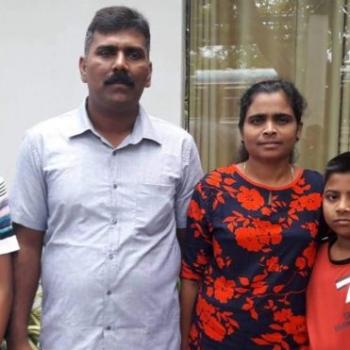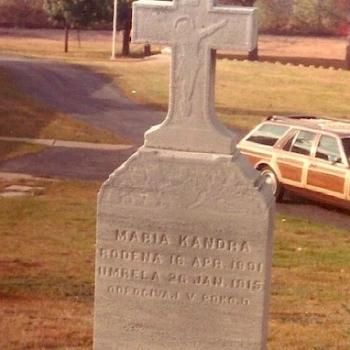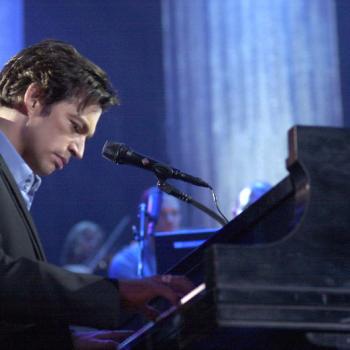Back in the 1950s a popular game show was called “Who Do You Trust?” It’s best remembered now as the show that first introduced Johnny Carson.
These days, if you asked the question “Who Do You Trust?” the answer might be: no one.
In 1972, half of Americans surveyed – 50% — said they believed most people could be trusted.
Today, that number has dwindled to a third.
Last year, a poll found that Americans are overwhelmingly suspicious of each other. Less than one-third expressed trust in clerks who swipe their credit cards, drivers on the road, or people they meet when traveling.
There’s no single explanation for it, though people have theories. A few years ago, author Robert Putnam wrote a best-selling book called “Bowling Alone.” Putnam argued that Americans have abandoned their bowling leagues and Elks lodges to stay home and watch TV. We don’t socialize. We don’t gather in groups. We spend our days isolated from one another, or connected only by computer. We’re detached. And, as a result, he said, we are less trusting than the generations that came before us.
We’ve stopped giving, sharing, confiding, depending. A sense of community has vanished.
But then: we encounter today’s scripture.
To a world mistrustful of everyone and anyone, God says: Trust in me.
To a world anxious about the future, worried about getting ahead and what to eat or how to dress, Jesus says: Don’t worry. Tomorrow will take care of itself.
To a world craving the latest, the fastest, the coolest, the hottest, he says: No. Look elsewhere. Look to what is small and simple and beautiful—the birds, the flowers. God takes care of them. He will take care of you.
Trust in me, he says. Trust in God.
“I will never forget you,” the Lord says in the haunting words from Isaiah.
The psalmist cries out: “Only in God is my soul at rest…with God is my safety and glory.”
And in the gospel Jesus echoes that, saying very simply: “Don’t worry.” Three times he repeats that. Don’t worry about food, or drink, or what you will wear.
“Seek first the kingdom of God and his righteousness,” Jesus concludes, “and all these things will be given you besides. Do not worry about tomorrow; tomorrow will take care of itself.”
Jesus is asking us, almost literally, to take a leap of faith.
It’s a hard message for a disbelieving world.
But that’s true about so much of the gospel.
Last week’s gospel reading may have been the most difficult in all of scripture, as Jesus offered a challenge that could turn our world upside down. It’s the Christian paradigm summed up in just three words:
“Love your enemies.”
As if that weren’t enough, this week, we encounter what might be the second most difficult challenge – summed up in two words.
“Don’t worry.” God will give you what you need. Just trust.
Make no mistake: these ideas are radical. They fly in the face of human nature. They contradict every instinct we have.
But that, I think, is the point. Here, in these final days before Lent, as we prepare once again to go into the desert, we are being called to be radicals. We are being called to a kind of surrender. This Sunday, in particular, we are being asked to surrender certainty. Christ asks us to do something that may be, for some of us, even harder than loving our enemies.
We’re being told to trust. Don’t worry. Give it up to God.
Twelve years ago, when I felt the call to become a deacon, that was the last thing I wanted to do. I knew what being a deacon meant: there go my weekends. I knew it meant homework, and classes, and studying. I knew it meant sacrifice. I knew it meant surrender. Over more than 40 years of my life, that was not something I did very well, and it wasn’t something I really wanted to learn how to do. My life was happy and content. I was in charge. I didn’t especially like the idea of losing that—or of making a promise of obedience to a bishop.
But again and again, God kept saying, “Are you sure? Because I have another idea.” The growing desire to serve the church as a deacon was battling with my own desire to hold on to the life I knew, and the life I was comfortable with, the life that was my own.
So after a few months of wrestling with tis, I made a bargain with God—which is always a risky proposition.
For the first time in my life I told him: okay. You win. Here are the keys. You drive. Take me where you want for as long as you want. If this leads all the way to ordination, that’s fine. If not, that’s fine, too. You’re in the driver’s seat. I’ll go along for the ride, wherever you want me to go.
And here I am. Looking back on it, I realize now: it was probably one of the best decisions of my life. And it was one I essentially left in the hands of God.
In 2007, not long after I was ordained, a colleague of mine at CBS gave me a holy card from the funeral of Fr. Mychal Judge, the Franciscan priest who became the first casualty of 9/11. This woman had known him. Her father had grown up with him in Brooklyn. Fr. Mychal had presided at her wedding.
Today, I have the card over my desk at home. It carries the words of what has now become known around the world as “Mychal’s Prayer”:
Lord, take me where you want me to go
Let me meet who You want me to meet
Tell me what you want me to say
And keep me out of your way.
Those are good words to live by. And I think they encapsulate, too, the message of the scripture today: Let go and let God. Don’t worry. Trust.
It can be a powerful exercise for living as we begin Lent.
Take that leap of faith. Who knows what God has planned for any of us? “Seek first the kingdom of God”—and find out.
As we prepare to receive Christ in the Eucharist this morning, look deeply into the message of this Sunday’s gospel and ask:
Who do you want to guide your life?
Who do you trust?











